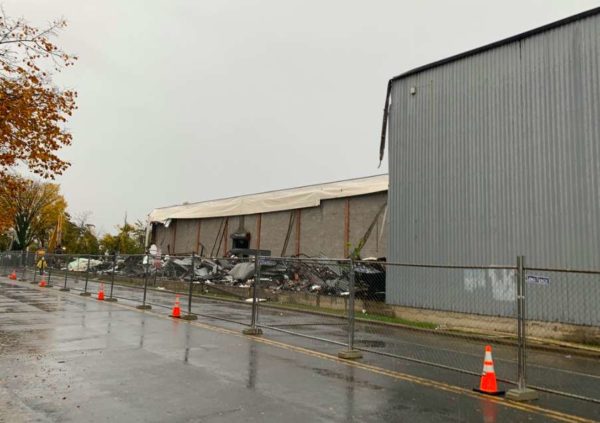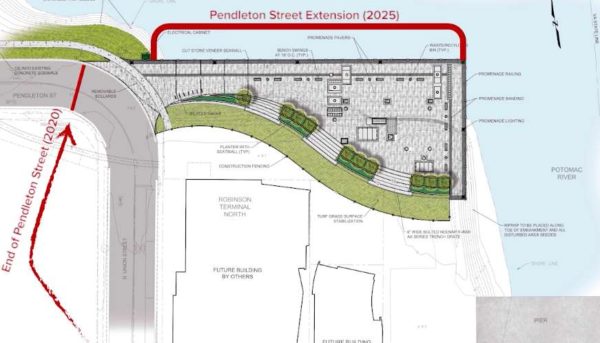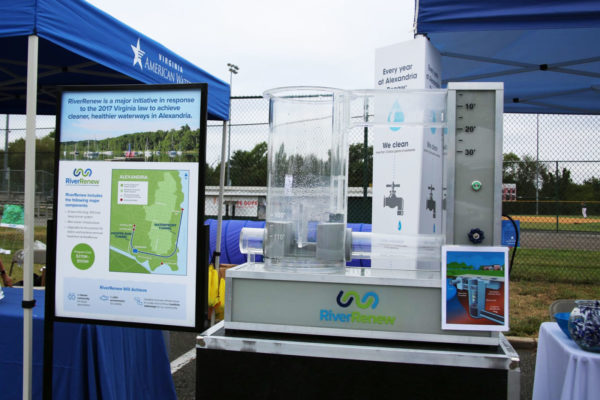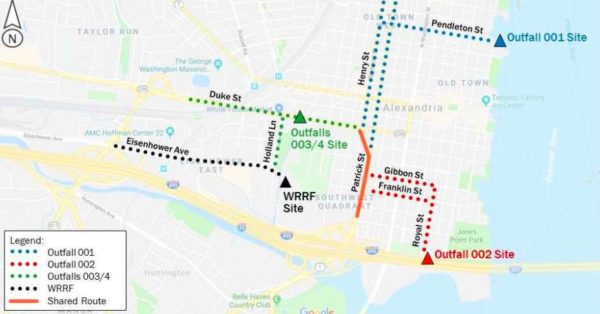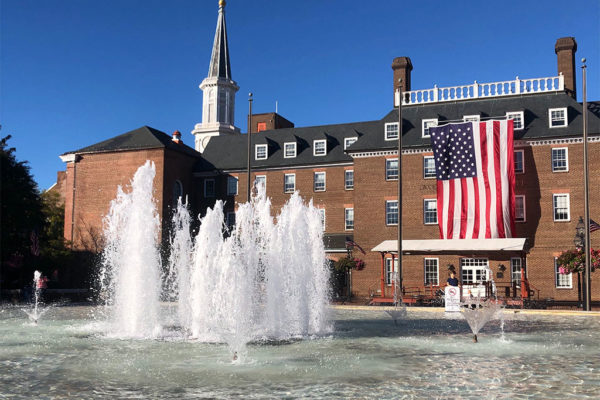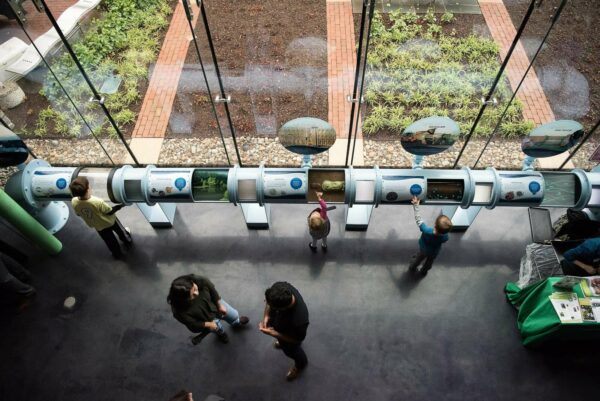
A new state grant could help fund the city’s expensive, state-mandated RiverRenew project and offset some of the sewer rate increases for Alexandrians.
According to a press release, Alexandria Renew Enterprises (AlexRenew) — which runs the RiverRenew project — has been recommended to receive a $50 million grant to support construction on the project. The RiverRenew project is an overhaul of the city’s combined sewer system in Old Town that results in millions of gallons of sewage flowing into the Potomac River ever year.
The grant funding is part of the $411.5 million American Rescue Plan (ARP) dedicated to restoring water and sewer infrastructure.
“Investment in our water infrastructure is crucial to a thriving Alexandria, and we are greatly appreciative of the Governor, our local delegation, and state leaders for their support of this historic program,” said AlexRenew General Manager Karen Pallansch in the press release.
Pallansch added that the funding could offset some planned sewer rate increases. A rate increase by 6.9% was deferred last year due to coronavirus but was implemented earlier this year. In the press release, Pallansch said the sewer rate increases to fund the RiverRenew program could last for decades.
The ARP investments will still need to clear the General Assembly at a special session on Monday (Aug. 2).
“We feel very good about the prospects of the General Assembly agreeing to the Governor’s proposal,” said Pallansch. “The Northern Virginia legislative delegation has been an important partner in this effort.”
Former Mayor Allison Silberberg very publicly didn’t plan on running against Mayor Justin Wilson in the Democratic primary, but as weeks slipped by and no other challenger came forward — and Council Member Mo Seifeldein dropped out — Silberberg said she felt she needed to step up.
Three years after Silberberg lost her reelection bid to Wilson, she’s back to reclaim the position.
“I couldn’t just stand by and watch our city put at risk by destructive policies of our current mayor,” Silberberg said.
Wilson has racked up several endorsements from current and former members of city leadership, including other City Council members and state legislators, but Silberberg said she isn’t particularly worried by that. Silberberg said in the last week, her campaign has raised over $64,000, while Wilson recently announced that he raised $90,000.
“I’m not concerned,” Silberberg said. “In many cases, that’s the old guard. I’m honored to have support form people across our city. We’re at a crossroads in our city. I’m a person who gets things done and I listen to people.”
Silberberg’s list of objections to Wilson is, beyond a “greatest hits” of concerns that have emerged from local advocacy groups like Bring Integrity Back to Alexandria, an extension of many of the same battles Silberberg fought with Wilson on when the two were locked in opposition during her tenure as mayor.
Silberberg said some of the biggest issues fueling her campaign are:
- Reverting Seminary Road Changes — “Wilson took away vital travel lanes on Seminary Road,” Silberberg said. “I would restore them. It’s a major arterial road to our only hospital. It was one of the safest streets in the city, the data showed that, but in a distorted kind of way he said this is a vote about public safety. Thirteen civic associations banded together and said do not do this, it affects every resident in the city.”
- Opposition to City Stream Restoration Projects — “I’m fighting to save Taylor Run… saving the forest there, and Strawberry Run,” she said. “I would listen to environmentalists, scientists and experts who have come forward on their own to say that this is a disaster in the making, to destroy the forest. This is some of the last remaining forests in our city, you can’t just replant and wait 30 years, because it’s not just the trees but the environment around it.”
- School-Affordable Housing Colocation — “I’m committed to protecting limited school properties from housing,” Silberberg said.
- Opposition to Eisenhower Slaughterhouse — “He pushed through the slaughterhouse where the existing businesses a football throw away banded together and banded the Mayor not to do that,” Silberberg said. “There are no other slaughterhouses within the beltway, and not one in our city. The impact on environmental waste is really upsetting — not to mention the smell. It was dismissive of the fact that the business owner has had numerous code violations in other states. I would not have supported that.”
Some of the reversals could be a challenge. City staff recently laid out the costs to alternatives to the Taylor Run Stream Restoration the city could be required to pursue to keep up with its Chesapeake Bay Watershed credit requirements.
Silberberg is dubious of staff’s claims.
“Staff, with all due respect, seems to be inflating or misrepresenting the costs for alternatives,” she said. “We need to have all that vetted openly and discussed.”
Silberberg said she was also surprised and frustrated that staff hadn’t tested the soil at Taylor Run before committing the city to funding the overhaul.
“Nobody on the city staff, and they admitted this, that they hadn’t tested the soils at Taylor Run,” Silberberg said. “Someone on their own volition hired a highly regarded laboratory, tested the soils, and it came back with negligible amounts of phosphorous, that’s one of the driving forces. So basically the city admitted that they were basing their analysis and conclusions on a generic version of soil samples in a whole other region. That’s not how we want to do analysis when it comes to a treasured spot in the city.”
Taylor Run, along with some of the other issues, go back to what Silberberg sees as a recurring problem with transparency and ethics in city leadership. Silberberg and Wilson have clashed over issues about ethics for nearly a decade, including a protracted battle over a proposed ethics pledge in 2016.
“We must restore integrity and transparency and adopt meaningful ethics reform,” Silberberg said. “That is certainly a top ethics reform, and we need a leader with demonstrated record of truth, transparency and ethics, and I am that leader. I led with an ethics initiative, and the person who led the effort to water that down was then Vice-Mayor Wilson. We did accomplish some goals, but didn’t go nearly as far as what I wanted.”
Silberberg argued that information that came to light from public Freedom of Information Act requests, and later printed by the Alexandria Times, not only showed that there were behind-the-scenes discussions on issues like Seminary Road and the Potomac Yard southern entrance that the public should know about, but also that there was too much information in those that was redacted.
“Some of the lines that weren’t redacted, which wasn’t very much, showed that he distorted the truth or lied and misled the public,” Silberberg said. Read More
The old Robinson Terminal North, once the abrupt northern end to the Old Town waterfront, is no more.
Demolition was mostly wrapped up this weekend after a quick tear-down, and the plan is to make the location part of the broader effort to reform Old Town’s sewer system called the RiverRenew program.
“Behind me is the Robinson Terminal North warehouse,” said Kelvin Coles, deputy design manager for the RiverRenew program, in a video. “Many residents and visitors will recognize this large steel building as the dividing landmark between Oronoco Bay park and Founders Park.”
The property a coal storage facility, along with other industrial uses, and ultimately a Washington Post shipping hub before it was decommissioned in 2013.
The property is adjacent to outfall 1, one of four sewer outfalls in Old Town that is the subject of the combined sewer system overhaul. On average, there are around 30 overflow events at outfall 1 alone. The plan is to build a diversion facility to direct the outflow into a tunnel.
Scene from my Sunday Morning Run: One less warehouse on Alexandria’s waterfront.
Robinson Terminal North is no more. pic.twitter.com/O28vdFjwPk
— Justin Wilson (@justindotnet) November 22, 2020
Construction on the new project is expected to begin in spring 2021 and continue through winter 2024. The facility will be mainly below ground once complete.
Above ground, the plan is to extend Pendleton Street into a promenade. The program is planned to feature benches and potential space for programming.
Pendleton Street Extension image via RiverRenew
(Updated 4:25 p.m.) Local wastewater management service Alexandria Renew Enterprises (AlexRenew) is still going to need that $370 to $555 million for the massive upcoming infrastructure project, but due to COVID-19 the organization is cutting down the planned utility rate increase.
“Recognizing the impact COVID-19 has had on the Alexandria community, AlexRenew has updated its previously planned budget, which included an 11% rate increase that was approved last year to support RiverRenew, a state-mandated program to address Alexandria’s combined sewer pollution,” AlexRenew said in a press release. “While an increase is still necessary to support the project, AlexRenew has reduced its rate increase to 6.6%, which will go into effect July 1.”
The utility service said that the average residential customer could see an average monthly bill increase of less than $3 per month with this approved increase.
The reduction comes amid widespread job loss that’s hit Alexandria harder than some of its neighbors, like Arlington. Ongoing construction, and a state-manded 2025 deadline, means that AlexRenew can’t eliminate the bill increase entirely.
“The updated Fiscal Year 2021 budget will allow AlexRenew to continue essential operations to clean wastewater while fulfilling its commitment to complete RiverRenew, a state-mandated program to address Alexandria’s combined sewer pollution, by the 2025 deadline,” Alexrenew said. “To continue the needed investment in this construction program, parts of which are currently underway and the bulk of which will be awarded this December, a rate increase is needed.”
After it came to light that the city was dumping millions of gallons of raw sewage into the Potomac River, the state required Alexandria to completely reform its sewer system by 2025. The city has assigned that task to Alexandria Renew Enterprises (AlexRenew), which in been pushing forward with RiverRenew — the largest infrastructure project in Alexandria’s history.
AlexRenew also announced that the RiverRenew project has also earned low-interest loans through state and federal programs. Additionally, in April 2019, the Virginia General Assembly appropriated a $25 million grant in support of RiverRenew. The organization also made internal cuts, like freezing pay increases for staff, hiring freezes, reducing discretionary spending and deferring capital projects.
“We understand the impact COVID-19 has had on the lives of Alexandrians, and we have adapted to continue to serve our community 24/7/365 by keeping our community healthy through cleaner waterways,” says Karen Pallansch, AlexRenew CEO. “AlexRenew remains focused on fulfilling its vital mission to manage wastewater and improve the waterways that connect us.”
Top photo via Alexandria Renew Enterprises/Facebook
A global pandemic is not stopping forward progress on RiverRenew, a project that aims to overhaul the city’s sewer infrastructure that is annually dumps 11 million gallons of raw sewage into the Potomac River.
The project is the largest infrastructure project in the city’s history, with a price tag that increased last year to an estimated $464 million. The project recently cleared its environmental assessment by the National Park Service that was required because portions of the project run through Jones Point Park, George Washington Memorial Parkway and the bed of the Potomac River.
“The National Park Service (NPS) has completed an environmental assessment for Alexandria Renew Enterprises’ (AlexRenew) proposed RiverRenew project,” AlexRenew said in a press release. “The NPS (Regional) Acting Director… signed a Finding of No Significant Impact (FONSI) for the RiverRenew environmental assessment on April 14, 2020.”
This #TunnelTakeoverTuesday, AlexRenew and the National Park Service announced the Finding of No Significant Impact…
Posted by Alexandria Renew Enterprises on Tuesday, April 21, 2020
The environmental assessment outlined several points of concern, like potential erosion and sediment, damage to historic parks, and noise generation. In each of these instances, however, the “no action” alternative that would result in continued dumping of sewage was considered more damaging and would violate legislation requiring the city to take action.
City Manager Mark Jinks said in a recent budget meeting that the project, being managed by AlexRenew, is not impacted by cuts made in the city’s budget.
The press release said that construction is planned to start this December — slightly earlier than had been initially scheduled — and is expected to last through mid-2025.
Image via National Park Service
As Alexandria’s Combined Sewer Overflow (CSO) project RiverRenew starts making progress, it’s looking increasingly likely the project’s cost will approach the half-billion dollar mark.
During an update at the City Council meeting on Dec. 10 (Monday), Mayor Justin Wilson said the price will be towards the upper end of the $370 to $555 million price range.
“We’ve been able to refine the pricing… the numbers do not ever get smaller, they get bigger,” Wilson said. “The current estimate is around $464 million. Those numbers have gone up.”
The massive infrastructure project — the largest in the city’s history — was an unfunded mandate from the state legislature. The state will require Alexandria to completely overhaul its centuries-outdated sewer system by July 1, 2025, to prevent sewage from flowing into the Potomac River during rainstorms.
The good news, for Alexandria, is that since the initial mandate the state has started putting some funding into the project. The General Assembly adopted a budget earlier this year that included $25 million for the project. This year, Wilson said the city government is back requesting $75 million more.
“We will hear in a couple of weeks whether there’s money in the governor’s budget,” Wilson said.
Meanwhile, Wilson said three design-build teams have been shortlisted for the project, and will have to submit proposals for the project by Feb. 11. From there, Wilson said it will be a pretty quiet year in terms of news on the project as Alexandria Renew Enterprises chooses who is awarded the contract. The goal, Wilson said, is to have a design selected by December 2020.
“We still have a substantial amount of work to do,” Wilson said, “[but we’ve] made a lot of progress.”
Photo via Alexandria Renew Enterprises/Facebook
It has been years since the City Council has been giddy during a meeting discussing its state legislative package.
For the first time in decades, there is a Democratic majority in the Virginia legislature, which is a boon to the city’s all-Democrat council.
Mayor Justin Wilson previously told ALXnow that the win opens up doors for several longstanding city goals, like more free-reign to control local financing. At a City Council meeting last night (Tuesday), some of those goals took shape in a draft of the city’s legislative package.
Every year, the city assembles a selection of local requests for Alexandria’s legislative representatives to take to Richmond. Proposals have ranged from increasing the minimum wage to changes in the minutiae of preschool management, and most of the requests were ignored or shot down by the Republican majority.
“As everyone understands, this is going to be quite a different General Assembly session,” Wilson told the City Council. “That’s certainly a very exciting thing.”
Officials warned, however, that the city had to exercise some restraint to ensure that most of the goals would be approved.
“This is a clear double-edged sword for us,” Sarah Taylor, the city’s legislative director, told the City Council. “The opportunities are really good. The legislature and our delegation will be able to do some really great things, but we have to be very smart and very strategic in how we approach things.”
Taylor said the city priorities were broken up into three categories:
- State investment in infrastructure
- Protection and expansion of local authority and funding for localities
- Access, equity and equality
The big ask for the infrastructure investment is assistance with the RiverRenew project, the largest infrastructure project in Alexandria’s history and the result of an unfunded mandate by the state legislature. The project is estimated to cost between $370 and $555 million. It secured some funding earlier this year, but the city is requesting $65 million more.
Taylor said state Sen. Richard “Dick” Saslaw (D-35) asked for $75 million. Several members of the City Council noted that they wouldn’t say “no” to higher funding than what they requested.
Virginia is a Dillon Rule state, which means local authorities can only exercise powers expressly granted to them by the state, but several of the items in the legislative package aim to pick away fractionally, like granting localities the right to regulate firearms in government buildings and property.
“There’s a lot that could be done with local authority,” Taylor said. “There are a lot of pieces that could be done incrementally.”
Other specific asks in the legislative package include:
- Incrementally raise the minimum wage in Virginia to $15/hour
- Ratify the Equal Rights Amendment
- Allow voters to use an otherwise valid but expired photo ID
- Amend the Virginia Constitution to establish the bipartisan Virginia Redistricting Commission
- Additional state funding for K-12 education
- “Red flag” gun control laws and stronger background checks
- Broaden the coverage of the Communications Sales and Use Tax (CSUT) to include audio and video streaming services and prepaid calling services
- Comprehensive tax reform to allow more types of taxes and reduce reliance on property taxes
- Add Alexandria to the list of localities where a state income tax credit is available to landlords accepting Housing Choice Vouchers
- Full restoration of funding to the Northern Virginia Transportation Authority for local transit projects
- Legislation that will allow the city to increase recycling rates in our community and reduce the use of plastic bags, single use plastics and Styrofoam
A public hearing on the legislative package is scheduled this Saturday, Nov. 16. Final adoption of the package is scheduled for Dec. 12 with the legislative session beginning Jan. 8.
“To undo the amount of damage that has been done to the Commonwealth — to move the Commonwealth forward to a more progressive agenda — we may have to roll up our sleeves,” Councilman Mohamed “Mo” Seifeldein said. “We’re playing with house money and let’s clean up.”
“Gambling is still illegal in Virginia,” Wilson was quick to note.
“Well, maybe we can get a bill on that too,” Seifeldein said.
Staff photo by Kalina Newman
RiverRenew has a lot of tunneling to get through and not a lot of time.
Over the city’s objections, the state has required Alexandria to completely reform its sewer system by 2025. The city has assigned that task to Alexandria Renew Enterprises (AlexRenew), which in been pushing forward with RiverRenew — the largest infrastructure project in Alexandria’s history, estimated to cost between $370 and $555 million.
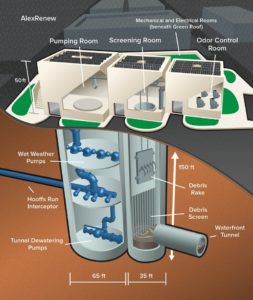 The pieces of the project are coming together, but the clock is ticking. Caitlin Feehan, program manager for RiverRenew, said that experience from other tunneling programs puts the estimated construction schedule at four and a half years, which includes accounting for construction delays.
The pieces of the project are coming together, but the clock is ticking. Caitlin Feehan, program manager for RiverRenew, said that experience from other tunneling programs puts the estimated construction schedule at four and a half years, which includes accounting for construction delays.
To accomplish the project before the deadline, Feehan said her team is working to get as much of the red tape checked off simultaneously.
“It’s a realistic timeframe for construction because the phase we’re in right now… we’re going through the process of simultaneous planning, preliminary engineering and permitting,” Feehan said. “It’s putting a lot of stress in this stage but ensures a realistic timeframe.”
Environmental assessments earlier this year helped establish the plans for building tunnels underneath Old Town to carry sewage to a new pumping station at AlexRenew’s Water Resource Recovery Facility at 1800 Limerick Street. The pumping station — which will run 150 feet below ground — was approved by the City Council in September.
There were some concerns earlier this year that the federal government shutdown could hurt the timeline for the environmental assessment, Feehan said, but the program was able to work with the National Park Service to keep the process moving forward.
“It’s a challenge to make sure we’re on schedule,” Feehan said, “but [we have an] experienced staff that knows how to mitigate risk.”
Feehan said various teams will come in, go through the process of finishing out final designs for the project, then get permits
Currently, construction is scheduled to start in mid-2021. Feehan said teams will use a state of the art tunneling machine that will be drilling 100 feet underground — deep enough that the underground activity should cause no disruption on the surface. RiverRenew will also be working simultaneously on the new pumping station to ensure that the project is ready to go online as soon as the tunnels are ready.
The final result, Feehan said, will be sewers that capture 98% of discharge sewer flow — as opposed to dumping millions of gallons of sewage into the Potomac River when it rains — putting the city sewer system in compliance with the state’s demands.
Top photo via Alexandria Renew Enterprises/Facebook



